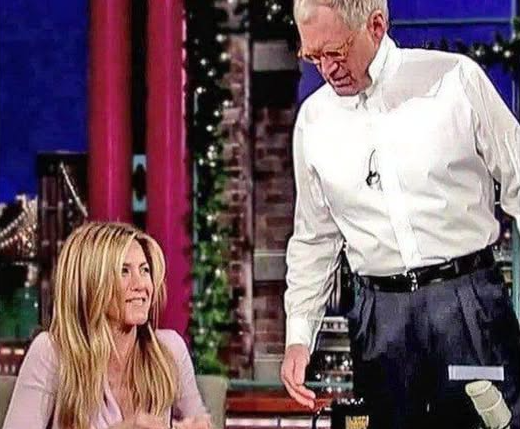For years, David Letterman reigned as the undisputed king of late-night television — sharp-witted, unpredictable, and often fearless in his interviews. But as culture has shifted, many of his past interactions are being reevaluated through a modern lens. What once passed for edgy humor now reads as invasive or inappropriate, particularly in moments involving female guests. One of the clearest examples involves Jennifer Aniston.
In 2006, Aniston appeared on The Late Show to promote The Break-Up, her romantic comedy with Vince Vaughn. She wore black shorts and a flowing blouse — stylish, professional, effortlessly poised, the kind of presence she has always carried. But the conversation quickly veered into uncomfortable territory.
Instead of focusing on the film, Letterman commented on her body. “That’s a tremendous outfit,” he said, staring openly. “You can only wear that if you have lovely, well-shaped, muscular, lengthy legs.”
Aniston smiled politely, doing what actresses of that era often had to do — laugh it off. But Letterman didn’t stop. He continued discussing her legs while the audience tittered awkwardly. “I hope somebody is TiVoing this because I can’t stop looking at this shot,” he added.
At the time, the moment was cringe-worthy; in hindsight, it is downright mortifying.
Viewers immediately sensed the discomfort. Aniston attempted to steer the conversation back to her movie, but Letterman’s comments lingered, shaping the tone of the interview. Watching it today, nearly two decades later, it’s striking how normalized such objectification once was — and how drastically cultural expectations have shifted since then.
Even so, that wasn’t the most uncomfortable interaction between them.
In a 1998 interview, years before The Break-Up, Letterman shocked audiences with an even more invasive stunt. Mid-conversation, he leaned in, grabbed Aniston’s head by the back of the neck, and — to her visible shock — sucked on a strand of her hair.
The audience gasped. Aniston froze, recoiling slightly, attempting to laugh but clearly unsettled. Letterman, unfazed, handed her a tissue and made a joke to diffuse the tension. The clip aired, the show moved on, and for years, few questioned it.
The footage resurfaced in 2021, circulating online with renewed outrage. Viewers who grew up watching Letterman’s show saw it again with fresh eyes — stunned that a boundary-violating moment had been treated as entertainment.
In the late ’90s and early 2000s, late-night talk shows existed on a different cultural wavelength. Hosts like Letterman, Jay Leno, and Conan O’Brien held immense influence, and their humor often blurred the line between playful banter and inappropriate intrusion. Women in Hollywood were frequently cornered with personal or sexualized questions — about their bodies, relationships, or appearance — all framed as comedy.
Aniston was not the only one subjected to this. Celebrities like Madonna, Janet Jackson, and Lindsay Lohan endured interviews where teasing crossed into discomfort. Yet the repeated incidents with Aniston have become symbolic, reflecting a broader pattern: women were expected to remain professional, even under humiliation.
Despite these experiences, Aniston continued appearing on The Late Show. In 2008, she returned, presenting Letterman with a necktie as a playful gift. What followed was more suggestive banter — humorous, yes, but steeped in the same dynamic that characterized their earlier interactions.
Through the lens of that era, these moments were part of a long-running routine: the flustered guest, the charmingly inappropriate host. Today, audiences recognize something deeper — the normalization of discomfort masquerading as humor.
What stands out isn’t just Letterman’s behavior but Aniston’s composure. Time and again, she maintained poise, smiling, laughing, redirecting. It is a kind of emotional gymnastics women in the spotlight have perfected over decades: remaining likable under pressure, maintaining the rhythm of the show even when boundaries are crossed.
Options were limited then. Walking off set wasn’t feasible. Calling out the host risked being labeled “difficult.” The unspoken rule was clear: endure, smile, move on.
The way these interviews are perceived today reflects both cultural change and industry evolution. In 2006, many shrugged off the behavior. In 2025, the same clip is viewed as a case study in power dynamics, consent, and professionalism.
Late-night television has since evolved. Hosts like Stephen Colbert, Jimmy Fallon, and Graham Norton operate with more awareness of boundaries, greater respect for guest comfort, and far less tolerance for objectifying or demeaning jokes. Social media ensures immediate accountability; moments once unnoticed are now analyzed and critiqued within hours.
Letterman himself has publicly expressed regret for aspects of his behavior, especially during his later years and post-retirement interviews. He has acknowledged being “a different person” then, shaped by an industry that rewarded audacity over empathy. Yet remorse cannot erase the unease left behind by these moments.
For Jennifer Aniston, the irony is striking: she remains one of Hollywood’s most poised figures — admired not only for her acting but for navigating public life with dignity. In those uncomfortable interviews, she wasn’t just promoting a film; she was surviving an era that demanded constant composure in the face of disrespect.
Watching the 2006 interview now, the silence between Letterman’s remarks and Aniston’s strained laughter is palpable. It’s the sound of professionalism holding steady — and the sound of an era that is thankfully ending.
In the evolution of celebrity media, that clip is more than cringe-worthy television; it is a reminder of progress and the work still ahead.
What once drew laughter now draws discomfort, and that is meaningful. The awkward smirk, the forced chuckle, the unchecked power dynamics — once hallmarks of late-night entertainment — now illustrate behavior we no longer tolerate.
